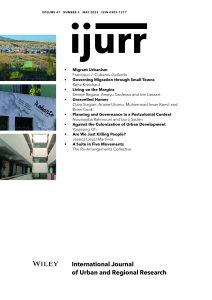International migrations are transforming the urban landscape in cities all around the world. In this article I address the effect of Cape Verdean migration on the built environment of Lisbon’s periphery. Specifically, I analyse a traditional practice of mutual aid originating in rural Cape Verde, the djunta-mon system, as a device of migrant urbanism projected onto the urban landscape of the Cova da Moura neighbourhood. In this article, which is based on ethnographic fieldwork, I discuss the role of the djunta-mon in the urban evolution of the neighbourhood from its formation in the 1970s to the present day. The data collected shows that this practice has had an important effect on the appropriation, functional delimitation and significance of the urban space by residents. The results thus point to the importance of understanding how the cultures and identities of human groups crystallize through the processes of social production of space.
Details
Written by:
Francisco J. Cuberos-Gallardo
Digital Object Identifier (DOI)
10.1111/1468-2427.13168
About DOI

